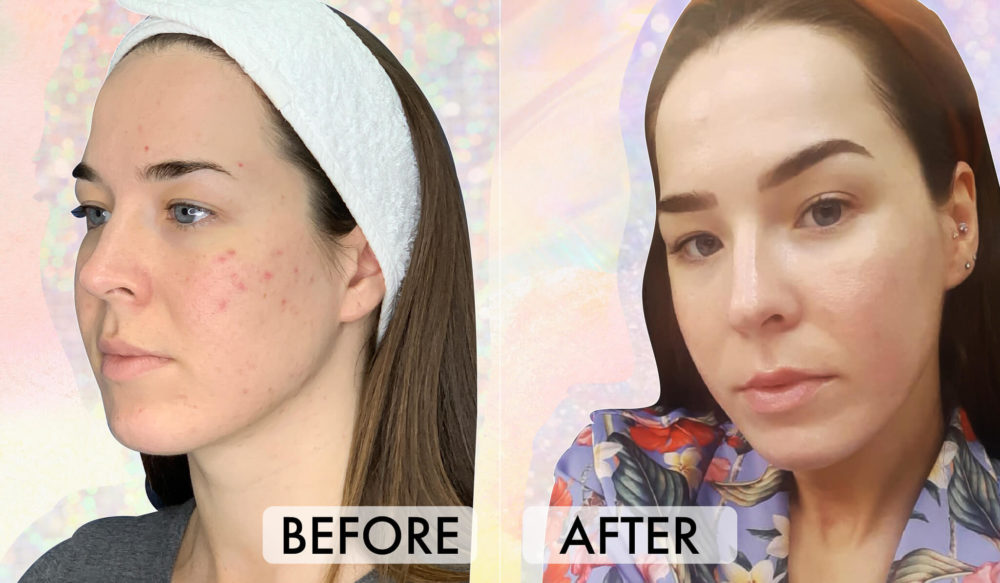Derms Say You Should Prob Skip These Skincare Ingredients In Winter

You probably wouldn’t wear flip-flops in the snow or sport a cozy sweater when it’s blazingly hot outside. In the same way we switch up our wardrobes, it’s good practice to tweak our skincare routine for the seasons.
Given that winter’s chill is just around the corner, it’s time to start thinking about cold-weather beauty routines. Lucky for you, we spoke with a handful of dermatologists to see what ingredients we should probably avoid (or at least use less of), and which ingredients we should swap into our regimen in their place.
1. Alcohol-Based Toners
Every single dermatologist we spoke to strongly urged against using alcohol-based toners, which are notoriously drying on all skin types. Add in cold and dry blustery weather and indoor heating, and we’re dealing with a recipe for a seriously parched dermis.
“Alcohol strips the skin of its natural oils, which defend the skin against trans-epidermal water loss, or TEWL,” explains Dr. Geeta Yadav, a board-certified dermatologist and founder of FACET Dermatology. “Skin is already at a higher risk of TEWL in winter.”
She recommends taking a peek at the ingredient list, which lists ingredients from the highest concentration to the lowest. If alcohol is one of the first ingredients, say sayonara.
What to Use Instead

People with oily skin often reach for alcohol-based or otherwise astringent toners to help mattify their skin. Dr. Yadev says that if this is something you’re trying to achieve, to swap in a witch hazel toner that’s infused with skin-soothing ingredients like glycerin, aloe, and/or chamomile. Two good options include Thayer’s Rose Petal Facial Toner, $11, and Burt’s Bees Sensitive Toner with Aloe & Witch Hazel, $10.

As an alternative, you could also try double cleansing. Dr. Yadev says, “This practice helps to thoroughly cleanse skin without dehydrating it.” Then I Met You’s award-winning The Cleansing Duo, $68, is a double cleanse system that will legit get you amped to wash your face.
2. Aggressive Exfoliators
You don’t have to completely nix exfoliators in the winter, but the derms we spoke to highly recommend pulling back the reigns a bit. This includes physical and chemical exfoliants for both face and body.
“While it is still important to exfoliate, it’s very easy to overdo it and irritate the skin,” notes Dr. Margarita Lolis, a board-certified dermatologist with Schweiger Dermatology Group. “Harsh scrubs can physically break down the protective lipid barrier of the skin, and chemical exfoliators — such as glycolic or salicylic acid – can increase dryness and [cause a burning sensation].”
What to Do Instead

Again, you don’t need to stop exfoliating completely. Instead, swap in milder exfoliating products — like products with gentler physical exfoliators or lower concentrations of acids — and use them no more than once a week.
Dr. Yadev also recommends substituting an alpha-hydroxy acid (AHA) with a large molecule size, like mandelic or lactic acid. She says, “These AHAs help resurface but are gentler than forms like glycolic acid because they cannot deeply penetrate the skin.”
The WISHFUL Yo Glow AHA & BHA Facial Enzyme Scrub, $39, is a perfect example with its gentle enzyme and low acid formula. The physical exfoliators it uses are also super soft. For body, check out G.L.A.M. Body Scrubs Lavender Lush Body Scrub, $15, which uses ultra-fine sugar to buff away dead skin cells.
Posts You'll Love:
4. Retinoids
Like exfoliators, retinoids are another ingredient you don’t have to completely write off once temps drop. However, you may find that you need to adjust your application schedule or formula concentration. Winter’s also not an ideal time to start using retinoids for the first time.
“Though they offer remarkable anti-acne and anti-aging benefits, retinoids are known for their skin-sensitizing and drying side effects,” says Dr. Yadev. “Because retinoids accelerate cellular turnover, skin will begin to shed its surface layers faster, making it very common to experience dry patches, peeling, and flaking.”
What to Do Instead

Depending on your skin type and how well it tolerates retinoids, consider cutting down usage to once or twice a week to prevent any of the side effects mentioned above. Really pay attention and listen to your skin to see what it’s tolerating with the seasonal shift, then adjust accordingly.
Another option is to try a retinol alternative, such as plant-based bakuchiol, that’s going to give you comparable anti-aging benefits but without the sensitivity, dryness, or peeling. Herbivore Moon Fruit 1% Bakuchiol + Peptides Retinol Alternative Serum, $60, is a great option for winter since it combines bakuchiol with peptides, glycerin, jojoba seed oil, and nourishing botanical extracts.
5. Harsh Soaps
It might seem like any old face cleanser will do the trick, but this first step of your skincare routine can help set you up for success — or do the opposite. Dr. Lolis tells us that harsh bar soaps, facial cleansers, and body washes can be notably drying and can even disrupt your pH balance, which is an issue that only gets worse in the winter months. Cleansing products that are highly fragranced are also no-nos.
What to Use Instead

If you notice a dry, tight, itchy, or sensitive feeling after washing your face or stepping out of the shower, that’s a sign you need to swap in a gentler option.
“To provide your skin with ample hydration during the winter, I recommend switching to a cream-based cleanser as these tend to be less drying,” notes Dr. Tina Alster, a board-certified dermatologist and co-founder of The A Method. Try Versed Gentle Cycle Milky Cleanser, $15, or BYOMA Creamy Jelly Cleanser, $13.
Now that you’re fully briefed on which skincare ingredients to avoid in the winter, let’s take a sec to talk about some of the best winter moisturizers you can slather to keep your skin looking lit all season long.























Leave a comment